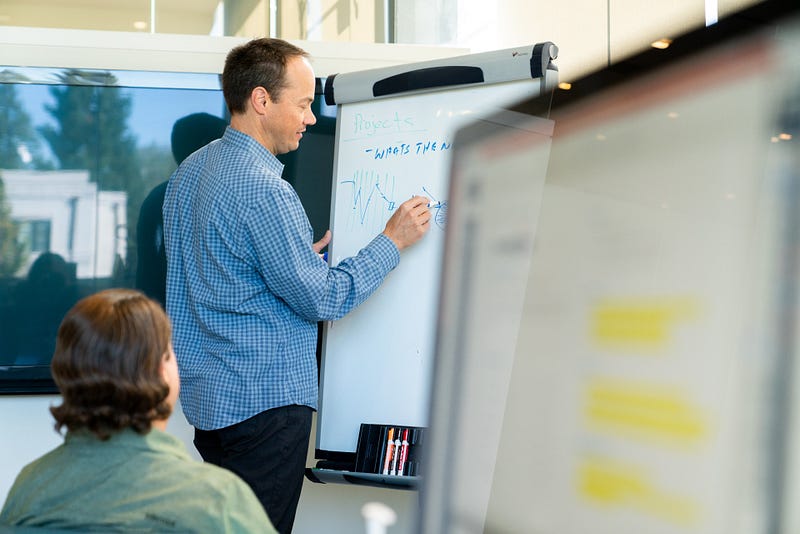The Future of Work is Now
Rally’s Future of Work investment thesis focuses on entrepreneurs who innovate well around the way we work.
The Future of Work is a projection of how the way we work will continue to rapidly evolve and how both employees and employers use technology to maximize the advantages of this evolution. We’ve seen major changes over the past few years, most notably with the shift to remote work, the rise of the gig economy and the Great Resignation.
The pandemic accelerated these changes, but they’re trends that started years before the pandemic began and they are here to stay. At the core, the changes are all about getting more fulfillment out of work and striking a work-life balance.
At Rally, we are dedicated to playing a meaningful role in enabling employees to do just that and enabling employers to capture the immense benefits of an engaged, healthy and happy workforce.
The success of remote work helped us reimagine how and where work gets done, but it’s also created a new set of challenges for HR leaders as they seek to attract, train and retain top talent and build a robust company culture. The percentage of office workers going partially or fully remote is projected to reach 70% by 2025 (Statistica), a multiple of what it was in 2020 before the pandemic.
The gig economy went from being basically nonexistent in 2008 to having 1B+ on-demand gig workers active in today’s labor market. Few, if any, technology or trends have impacted 20% of the global population in just over a decade. The gig economy is based on flexible, temporary roles where workers typically churn every few months, if not more. How do you recruit, screen and retain a workforce that fundamentally changes daily?
The Great Resignation saw workers quitting their jobs at near-record levels in search of better opportunities. 10 years ago, a good attrition rate was less than 10%. Today, even star companies are seeing attrition rates closer to 20%. Twice the attrition means twice the recruitment, onboarding and training effort. A tight labor market pushes that number even higher. And retention activities have become increasingly important to meet employee needs.

These challenges require solutions at mass scale, and companies who innovate well around these changes are a big focus of investment for Rally Ventures. Advances in automation, robotic process automation (RPA) and extended reality (XR) make it possible for employers to streamline processes, automate rote tasks and optimize their workforce. Quality of work also improves for employees who can spend less time on repetitive tasks and more time on work that’s valuable and meaningful.
There are several companies we’ve invested in that fall under our Future of Work thesis:
- Bugcrowd is a crowd-sourced security platform that helps enterprises develop a customized security testing program to bolster their security posture. Skilled cyber professionals can pick what they want to work on and when they want to do it, wherever they happen to be in the world.
- Epoch is an employee experience platform that helps HR teams manage and run their internal programs and events. It makes it possible for companies to take HR remote and deliver world-class company culture, regardless of where their employees are geographically located.
- Gappify is automating the office of the CFO with its cloud-based automation solutions and proprietary RPA architecture, giving accountants more time to focus on driving strategy and growth.
- Krista is an intelligent automation and conversational AI company enabling front line workers to offload rote tasks and more quickly access the information and systems they need for higher value tasks.
- Kyros is a digital platform for people and organizations within the recovery community. It operates as a marketplace to connect clients with service providers, and connects service providers with the additional services and capacities they need to scale.
- ManageXR is bringing the metaverse to enterprise with its enterprise level device management platform. As people move towards mass XR adoption in the enterprise space, ManageXR provides a full-fledged solution to help manage and scale XR deployments.
- Qualifi increases the productivity of recruiters with its on-demand phone interview platform. It eliminates the need for scheduling phone interviews, increases the productivity of recruiters and helps mitigate bias in the hiring process.
- Yardstik is a comprehensive, fully integrated human security software platform that is tailored to marketplaces and SaaS platforms, with an API-first approach that enables candidates to have a seamless and positive experience in an otherwise tedious part of the recruitment process.
A recent Future of Work investment is Nowsta, a work management platform built to hire, deploy and pay gig workers. Workers today are demanding a new level of flexibility. This affects how employees want to work, the way in which they’re scheduled and receive pay, and the overall makeup of a company’s workforce — a mix of seasonal, part-time and full-time staff.
Consequently, companies today have to adopt a flex model of work in order to meet the demands of a changing workforce, but this can be a nightmare for employers. Existing software is built on the premise of a 9–5 shift that assumes workers are in the same place every day, with no variance. There is a huge gap in the market to manage this new operational complexity.

The inspiration for Nowsta grew out of Founder and CEO Nick Lillios’ experience as a consultant working for a large food services vendor. It became clear that these types of large employers didn’t have the technology to manage these new types of workforces that consist of on-demand workers.
Nowsta uses machine learning and payments technology to provide an all-in-one solution for hourly workers. Their software facilitates scheduling and communication with features like GPS-enabled time clock functionality, mobile-optimized fast scheduling, and overtime and shift clock warnings.
Nowsta Pay eliminates the two-week pay period and allows employees to receive their wages the same day they worked their shift. And Nowsta’s labor marketplace connects employees with jobs they desire with employers who need their skillsets. Similarly, all of these features greatly reduce the administrative burden on employers to find, screen, schedule, communicate and pay a flex workforce.
Nowsta is building the operating system for flex work, and we’re thrilled to have them join our portfolio. Rally Ventures co-led Nowsta’s $41M Series B in December 2021 and they’ve seen explosive growth. Nowsta currently has 300,000 workers and 550 customers on their platform in industries like hospitality, food service, sports, distribution centers and more. From January 2021 through January 2022, Nowsta increased their annual revenue over 10x, and they’re expected to grow more than 3X by the end of this year.



